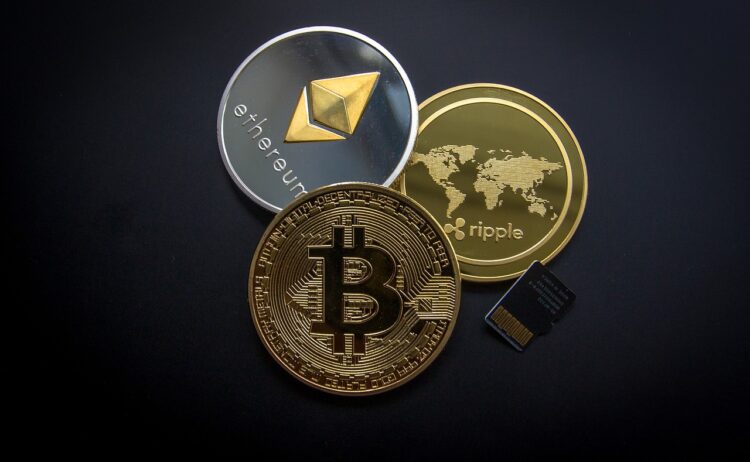Cryptocurrency has taken the world by storm, attracting millions of investors seeking to profit from the volatile yet lucrative digital asset market. However, once you’ve accumulated your crypto wealth, the question remains – how do you turn those digital coins back into cold, hard cash?
The process of exchanging cryptocurrency for regular fiat currency is not as straightforward as a simple bank transfer. There are several methods available, each with its own set of pros and cons. In this comprehensive guide, we’ll explore the top ways to sell btc, cash out your crypto and, helping you navigate the complexities of the exchange process with ease.
Table of Contents
Exchangers: A Convenient yet Risky Option

Source: freepik.com
One of the most popular methods for exchanging cryptocurrency is through the use of online exchangers. These specialized services allow you to quickly convert your digital assets into fiat currency, which can then be sent to your bank account, debit card, or online wallet.
The process is relatively simple: select the exchanger, specify the cryptocurrency and amount you wish to sell, confirm the exchange rate and provide your withdrawal details. The service will then generate a wallet address to which you transfer your coins. Once the transaction is confirmed on the blockchain, the exchanger processes the payment and sends the cash to your specified account.
The speed and convenience of exchangers make them an attractive option for many users. Transactions can be completed in as little as 10-15 minutes, with some services even boasting near-instant processing times. However, this convenience comes at a cost – exchanger fees can range from 1-10% of the transaction value, depending on the currencies involved and other factors.
Furthermore, using an unfamiliar or unregulated exchanger can be risky. There have been numerous instances of scams and fraudulent activities in the crypto exchange space, with users losing significant sums of money to unscrupulous operators. It’s crucial to thoroughly research any exchange service before entrusting them with your hard-earned crypto assets.
Crypto Exchanges: A Safer Option with Higher Fees

img source: cmsprime.com
Another popular method for cashing out cryptocurrency is through the use of regulated crypto exchanges. Unlike exchangers, which typically specialize in converting digital assets to fiat, crypto exchanges are primarily designed for trading between various cryptocurrencies.
To cash out using an exchange, you’ll first need to trade your desired cryptocurrency for a stablecoin or fiat-pegged token (such as Tether or USD Coin). This can then be withdrawn to your bank account or other fiat-based payment method.
The process involves registering for an account, passing identity verification checks, and then placing sell orders on the exchange. Once your trade is executed, you can initiate a withdrawal request, which will be processed by the exchange’s staff.
While crypto exchanges offer a more secure and regulated environment compared to exchangers, they come with their own set of drawbacks. Chief among these is the higher transaction fees involved. Exchanges typically charge higher commissions, often ranging from 2-5% of the transaction value, as you’re effectively paying two sets of fees – one for the crypto-to-stablecoin trade, and another for the subsequent fiat withdrawal.
Additionally, the withdrawal process can be slower, with some exchanges taking several business days to complete fiat withdrawals. This is due to the rigorous compliance checks and manual processing involved.
P2P Exchanges: A Decentralized Approach

Source: indonesiaexpat.id
For those seeking a more decentralized and anonymous way to cash out their crypto, peer-to-peer (P2P) exchanges offer an intriguing alternative. These platforms act as intermediaries, facilitating direct trades between buyers and sellers, without the involvement of a central authority.
To use a P2P exchange, you’ll need to create an account and list your desired trade (e.g., selling Bitcoin for US Dollars). Other users can then browse these listings and initiate a trade by depositing the agreed-upon fiat amount into a smart contract. Once the cryptocurrency transfer is confirmed, the fiat funds are released to the seller.
P2P exchanges offer several unique advantages. Since there is no middleman, transaction fees are typically lower, often around 0.5-1% of the trade value. Additionally, because trades are conducted directly between individuals, there is a greater degree of privacy and anonymity compared to centralized exchanges.
However, the decentralized nature of P2P platforms also introduces additional risks. Without a central authority overseeing trades, there is a higher likelihood of encountering scammers or fraudulent actors. It’s crucial to thoroughly vet potential trading partners and only engage in transactions after thoroughly assessing the associated risks.
Cryptomats and Crypto Wallets: Convenience at a Cost

Source: pixabay.com
For those seeking a more hands-on approach to cashing out their crypto, physical cryptomats (akin to traditional ATMs) and specialized crypto wallets offer convenient yet costly alternatives.
Cryptomats allow users to directly convert their digital assets into cash by transferring funds to a designated wallet address. Once the transaction is confirmed, the corresponding fiat amount can be withdrawn from the machine, minus any applicable fees.
Similarly, many crypto wallets now offer built-in cash-out functionality, enabling users to sell their holdings directly from within the app or software. This streamlines the process, eliminating the need to transfer assets to an external exchange or service.
While both methods offer a high degree of convenience, they come with significant drawbacks. Cryptomats are relatively rare, with limited geographical availability, and often charge exorbitant fees – sometimes exceeding 5% of the transaction value.
Crypto wallets, while more widely accessible, also charge substantial commissions for their cash-out services, with fees ranging from 2-5% of the transaction value. Additionally, both methods typically require users to undergo identity verification procedures, eliminating any semblance of privacy or anonymity.
Over-the-Counter (OTC) Trading: For High-Volume Transactions

Source: pexels.com
For high-net-worth individuals and institutions dealing with large cryptocurrency holdings, over-the-counter (OTC) trading offers a tailored solution for cashing out. OTC desks, typically operated by major exchanges or specialized trading firms, facilitate private, off-exchange trades between counterparties.
The process involves directly negotiating trade terms (price, volume, settlement details) with an OTC desk, which then matches the order with an appropriate counterparty. This eliminates the need to use traditional exchange order books, reducing slippage and price impact for larger trades.
While OTC trading offers a more personalized and discreet experience for high-volume transactions, it comes with its own set of trade-offs. OTC desks often require a minimum trade size (typically $100,000 or more), making them inaccessible to most retail investors. Additionally, the lack of transparency can lead to wider bid-ask spreads and potentially less favorable pricing compared to traditional exchanges.
The Choice is Yours: Navigating the Cash-Out Landscape

Source: freepik.com
As the world of cryptocurrency continues to evolve, so too do the methods for converting digital assets into traditional fiat currency. From the convenience of online exchangers to the decentralized nature of P2P platforms, there is no shortage of options available to crypto enthusiasts looking to cash out their holdings.
However, each method comes with its own set of advantages and drawbacks, and it’s essential to carefully consider your specific needs and risk tolerance before choosing a path forward. Whether you prioritize speed, security, anonymity, or minimizing fees, there is a solution that can cater to your unique requirements.
As with any financial decision, thorough research and due diligence are key. Take the time to understand the intricacies of each cash-out method, compare fees and processing times, and assess the reputation and track record of any service providers you plan to engage with.
By arming yourself with knowledge and making informed choices, you can navigate the complex landscape of crypto-to-fiat exchanges with confidence, maximizing your returns while minimizing potential risks and pitfalls.
So, whether you’re a seasoned crypto trader or a newcomer to the world of digital assets, embrace the journey of turning your virtual gains into tangible wealth, and make the most of the ever-evolving opportunities presented by this exciting and innovative asset class.

